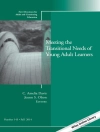This timely volume examines links between the emergingneurobiological research on adult learning and the adult educators’practice.
Now that it is possible to trace the pathways of the braininvolved in various learning tasks, we can also explore whichlearning environments are likely to be most effective. Topicsexplored in The Neuroscience of Adult Learning include:
* basic brain architecture and ‘executive’ functions of thebrain
* how learning can ‘repair’ the effects of psychological traumaon the brain
* effects of stress and emotions on learning
* the centrality of experience to learning and construction ofknowledge
* the mentor-learner relationship
* intersections between best practices in adult learning andcurrent neurobiological discoveries
Volume contributors include neurobiologists, educators, andclinical psychologists who have illuminated connections between howthe brain functions and how to enhance learning.
Although the immediate goal of this volume is to expand thediscourse on adult teaching and learning practices, the overarchinggoal is to encourage adult learners toward more complex ways ofknowing.
This is the 110th volume of New Directions for Adult and Continuing Education, a quarterly publicationpublished by Jossey-Bass.
Table des matières
1 Key aspects of how the brain learns.
2 Neuroscience and adult learning.
3 Fear and learning : trauma-related factors in the adulteducation process.
4 Brain self-repair in psychotherapy: implications foreducation.
5 The role of meaning and emotions in learning.
6 Experience, consciousness, and learning: implications forinstruction.
7 Meaningful learning and the executive functions of thebrain.
8 The neuroscience of the mentor-learner relationship.
9 Brain function and adult learning: implications forpractice.
A propos de l’auteur
Sandra Johnson and Kathleen Taylor are the authors of The Neuroscience of Adult Learning: New Directions for Adult and Continuing Education, Number 110, published by Wiley.












